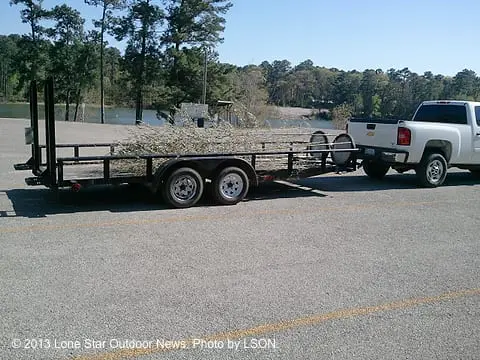 One of the best ways to catch fish is to make the structure they call home.
One of the best ways to catch fish is to make the structure they call home.
Fishing brush piles is an art that requires prepping, planning and executing. Some brush piles are visible to all anglers or have been sunk by the Texas Parks and Wildlife Department with their locations known. Others are coordinates only that angler knows.
Brush piles attract baitfish, provide cover, and are spawning areas for many species. The bush pile’s location and the materials used can make a very productive fishing spot if done correctly.
Tom Hungerford, a TPWD fisheries biologist, is a part of many projects that build brush piles and sink them in nearby waters. The setup for his brush piles consists of a large bucket of concrete with several branches fanning out from the concrete. The team then distributes them around area lakes.
Bamboo and the branches of Osage-orange trees have shown to have the longest life underwater with very little deterioration. In contrast, old Christmas trees break down and don’t last longer than a year before they deteriorate, according to Hungerford.
Hungerford and his team have sunk 20 bamboo structures during a recent project in Lake Arlington.
“Most brush piles hold up for about five years,” said Hungerford. “After that, they break apart.”
Outdoor stores sell kits to make artificial structures, but others choose to make them out of PVC pipe.
Hungerford approves these artificial methods, but warns anglers about using any toxic materials, like the ones used in pressure-treated wood. The wood will hold up for many years underwater but the chemicals do leak and can be harmful to the surroundings.
Hungerford said the first step in sinking a brush pile is to contact the controlling authority for the water body. Every body of water has different rules about putting in brush piles.
“They see the lake different from fishermen,” said Hungerford. “They see the lake as a pipe that controls water flow. “
Hungerford recommends anglers think of the future when sinking brush piles. Accidents happen when brush piles are sunk during high water levels. When the water level goes down, the structure gets in the way of oncoming boaters.
Brush piles — Giving fish a home
591
previous post

